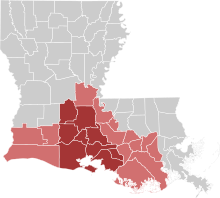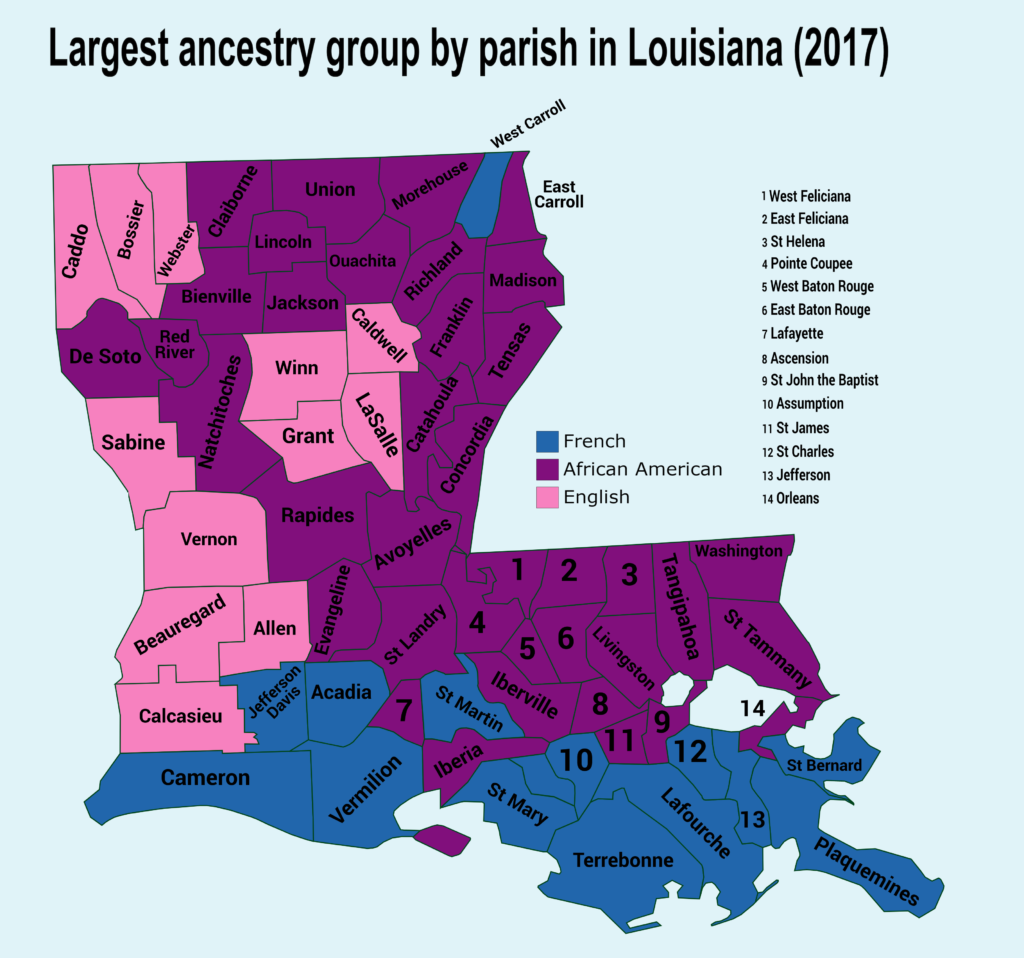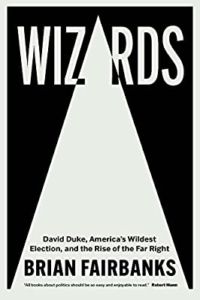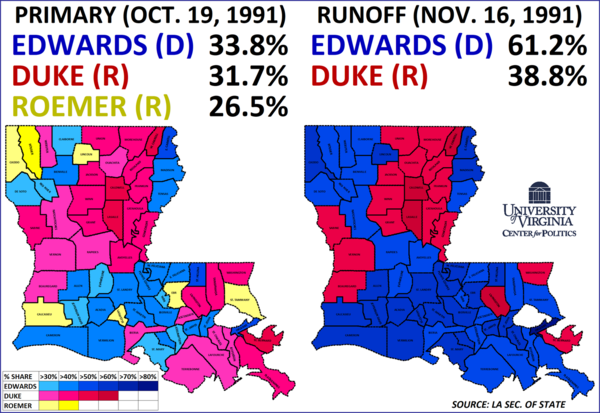David Duke & Louisiana’s 1991 Gubernatorial Election
Posted By Morris van de Camp On In North American New Right | Comments DisabledBrian Fairbanks
Wizards: David Duke, America’s Wildest Election, and the Rise of the Far Right
Nashville, Tenn.: Vanderbilt University Press, 2022
Brian Fairbanks is a Louisiana-based journalist who seems to be an ordinary liberal, looking for a Great Society-style social safety net. He has recently published a book about Louisiana’s 1991 gubernatorial election in which David Duke, a white advocate, nearly became Governor.
The book is long on minutiae concerning the 1991 race. The book also has a theme – David Duke’s near capture of a governorship altered the Republican Party’s trajectory, taking it far to the right. However, the book is short on genuine analysis of Duke’s ideology. It also fails to clearly explain how elections work in Louisiana, I had to search elsewhere for information about the mechanics of Louisiana elections.
Louisiana is unique among the 50 states in that its legal system is based on the Napoleonic Civil Code [2]. It has a large French-speaking population of Cajuns, while the northern part of the state is populated by Anglo-Southerners. Large numbers of Sub-Saharans are also present, as both the French and the Anglo-Southerners brought Africans as slaves.
 [3]
[3]Louisiana was founded by the French, and a large population of French speakers still lives there. The racially-aware Right does well in the areas settled by the French.
By the late 1980s, the “civil rights [4]” movement had won its great social victory. Politicians in both parties had become “colorblind” while seeking the sub-Saharan vote. This trend followed the progression of “civil rights” that had begun in the 1930s. Huey P. Long was Louisiana’s popular Governor at the time. He was a populist liberal who was entirely focused on New Deal-style programs to build roads, lift people out of poverty, and deal with the large corporations that dominated the state. He didn’t carry out any racial programs, however, other than to accept segregation.
When the “civil rights” movement intensified following the Second World War, there was plenty of trouble in Louisiana, but not nearly as much as in other parts of the South. There were some shootouts and riots, but nothing on the scale of what occurred in Detroit or the other Northern cities in the late 1960s.
By the 1980s, Louisiana politicians were walking a racial tightrope. They accepted both white flight and anti-white laws such as affirmative action and the 1964 Civil Rights Act. Then came David Duke. Duke was not a Louisianan, or even a Southerner. He was in fact descended from a veteran of the Union Army [5]. Duke had been born in Tulsa, Oklahoma to a family from Ohio that had lived in Kansas for several generations. (For his account of this one can read his autobiography [6], My Awakening [7].) Duke’s father [8] was an engineer and served in Laos during the Vietnam War with the United States Agency for International Development. Duke did not serve in the military, but did spend a summer in Laos, teaching English to Laotian military officers [9].
Duke was a young child during the “civil rights” struggle and his views on race began to change from the fashionable “colorblind” position to the unfashionable, but more realistic view when he was assigned to take the pro-segregationist side in a school debate. He encountered race-realist literature while doing research and was converted to white advocacy.
Duke’s activism was in full swing by the early 1970s. He held public meetings, and in 1974 he founded an organization called the Knights of the Ku Klux Klan. This was his own organization. It was different from the other iterations of the Klan that had preceded his. According to his own account, he recognized that a group such as the Klan tended to attract dangerous men and that they are easy for the FBI to infiltrate. The FBI also likes to goad low-IQ, gullible people into conspiring to commit illegal acts which the FBI then “stops” with a timely arrest. Fairbanks describes some of these.
In 1979, Duke decided to merge his group with another Klan faction that was led by Bill Wilkinson. He cut a deal to sell his mailing list for $35,000. Unfortunately, Wilkinson tried to double-cross Duke and pick up his supporters for free. He made a scene when Duke and Don Black tried to sell the list. It also turned out that Wilkinson was an FBI informant. Duke’s image suffered from the affair.
Duke continued to work, however, publishing material and selling books, including books on Holocaust revisionism. In 1989 he ran for a seat in the Louisiana state legislature. His opponent was John Treen [11], an ordinary Republican cuckservative. Treen was an accomplished and experienced legislator, but he ran a campaign in the same style as Hillary Clinton. Duke won due to his base of passionate supporters. He was in fact the first openly pro-white candidate to win an election [12] in America since the “civil rights” revolution.
 [13]
[13]The predominant ethnic groups in Louisiana. Duke’s most passionate supporters were in the north, as well as around the mouth of the Mississippi River.
Duke’s pro-white activism had not hurt him with Louisiana whites. He had passionate supporters, and Duke signs were everywhere. Additionally, many voters withheld their intentions from the pollsters, and thus his victory came as a surprise, similar to what happened with Donald Trump’s election in 2016.
Duke then ran for the US Senate in 1990. He didn’t win, but secured upwards of 600,000 votes: 55% of the white vote. It was an enormous accomplishment. Then came the gubernatorial election of 1991.
 [14]
[14]Edwin Edwards, also known as “Fast Eddy” or the “Silver Fox.” Accusations of corruption dogged him his entire career. He was eventually convicted of a number of white-collar crimes and did time in federal prison from 2002 to 2011.
There were two favored candidates. The first was Democrat Edwin Edwards [15]. Edwards was part Cajun. He’d been Governor before, but also carried a great deal of personal baggage: he was accused of infidelity, he liked to gamble, he’d pardoned a man who went on to murder his brother [16], and he only hired his own supporters to fill state jobs.
The other was Buddy Roemer [17], the incumbent. His term coincided with a string of unfortunate events. Oil prices had collapsed in the 1980s, so the state’s economy, which was already quite poor, grew even worse. Roemer unsuccessfully battled with the legislature and alienated key allies. He also switched from the Democratic Party to the Republicans midway through his term.
 [18]
[18]Buddy Roemer had been a Democrat. His father had been an Edwards supporter. He switched parties just as the Southern electorate was doing.
Roemer’s switch was part of the ongoing realignment in the South from the Democratic to the Republican Party. This shift is important and took place over four decades. When Franklin Delano Roosevelt died in 1945, support for the Democratic Party was massive. Its most stalwart voters were Southerners, because the Republicans had been the party of Lincoln, the Yankees, and Reconstruction. Between 1933 and 1964, the Democratic Party embraced “civil rights [4]” with increasing resolve. By the end of the 1960s, most Southerners ditched the Democrats on the national level; the shift occurred more gradually at the local level. In fact, David Duke first entered politics as a Democrat.
 [19]
[19]You can buy Greg Johnson’s The Year America Died here. [20]
The reason there were three top contenders in the race was because Louisiana had held a primary election, in which many candidates could run, followed by a runoff election. Roemer was widely expected to win, as the Republicans were gaining ground in the South. The primary’s results shocked the nation: Edwards and Duke came out on top. Even Roemer’s own supporters and employees had voted for Duke.
David Duke had one serious enemy: Beth Rickey [21]. Rickey was an old-school Republican who had endorsed Ronald Reagan and served on the Louisiana Republican State Central Committee, as had her father. Despite supporting Reagan, she still believed in the “civil rights” policies propagated the Radical Republicans who had fomented Reconstruction. She was appalled by Duke’s beliefs and formed a group called The Louisiana Coalition Against Racism and Nazism [22] (LCARN). Among other things, Rickey helped launch the career of the anti-white activist Tim Wise, who was himself involved with LCARN.
Rickey gathered a great deal of information to use against Duke. Although none of this caused his supporters to turn against him, it did bring national attention to the campaign. Edwards received large donations from wealthy Jews and others from outside the state.
Rickey never addressed Duke’s positions directly. Her tactic rather was what has come to be called “point and sputter.” Essentially, Rickey was a Sunday School teacher who used “devil words” against Duke. One can simply replace the words “racism” and “Nazism” in the name of her organization and replace them with “witchcraft” and “devil worship,” and Rickey’s ethos becomes clear.
Duke’s positions were strong on their own merits, however. In the late 1980s, welfare misuse was abundant, and Duke endorsed welfare reform. Many of the most egregious abusers of the system were sub-Saharan single mothers. They would have many children from many different fathers, and then become single mothers living on taxpayer funds. Whites were absolutely within their rights to see this as an outrage.
Crime was another issue. Rickey was a wealthy woman, and it is unlikely that she had known many white working-class people working in New Orleans’ ghettos, white police officers, or white crime victims. Crime, fueled by young sub-Saharan men, was rampant in New Orleans in the 1980s. Sub-Saharan violence was thus an unavoidable part of the political conversation. In 1989, for example, blacks had even attacked white spectators at a parade for Buddy Roemer (p. 66). And by the early 1990s, it was widely known that the New Orleans Police Department, itself mostly staffed by blacks, had descended into an utterly corrupt, criminal gang in its own right.
Edwards nevertheless won the election. Nonetheless it was still a victory for white advocacy. There is still hope for American whites, and David Duke showed that advocating for them in the political sphere is still possible.
Some have suggested that Duke could have run for Congress instead, where he may have had a greater chance for victory. Duke has run for other offices since then, but he never received as much support as he did then. He thus began to focus on metapolitical activities. Duke nevertheless definitely helped to shift the Republican Party further to the right. After the 1996 national election, the Republicans ended many of the benefits of the welfare state along the lines Duke had advocated a half-decade earlier.
Also, in the 1970s Duke had taken a car to the Mexican border along with some reporters and “patrolled,” searching for illegal immigrants. This was quite revolutionary at the time, whereas today ending immigration is a primary focus of the populist wing of the Republican Party. Fairbanks argues that Duke’s ideas were consistent with those of the 1992 Republican presidential candidate Pat Buchanan [25], who challenged George H. W. Bush from the Right. Buchanan’s ideas were in turn reused by Donald Trump in 2016 – even though Duke was insincerely “disavowed” by Trump during the campaign.
David Duke was certainly a pioneer and a harbinger for things to come, and we should praise him for it. It is true that he was convicted of white-collar crimes in 2002 and spent some time in prison. Personally, I think the investigation into his activities was entirely politically motivated, and it is extremely suspicious that he was imprisoned just when his anti-Zionist activism could have helped during the run-up to the Iraq War.
There is still much work to be done against very powerful enemies — but Duke showed us that it is possible to win.
* * *
Like all journals of dissident ideas, Counter-Currents depends on the support of readers like you. Help us compete with the censors of the Left and the violent accelerationists of the Right with a donation today. (The easiest way to help is with an e-check donation. All you need is your checkbook.)
Due to an ongoing cyber attack [26] from those who disagree with our political discourse, our Green Money echeck services are temporarily down. We are working to get it restored as soon as possible. In the meantime, we welcome your orders and gifts via:
- Entropy: click here [27] and select “send paid chat” (please add 15% to cover credit card processing fees)
- Check, Cash, or Money Order to Counter-Currents Publishing, PO Box 22638, San Francisco, CA 94122
- Contact [email protected] [28] for bank transfer information
Thank you for your support!
For other ways to donate, click here [29].



